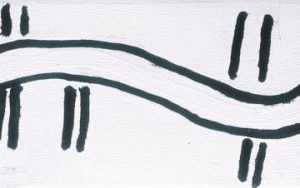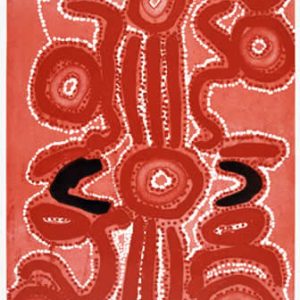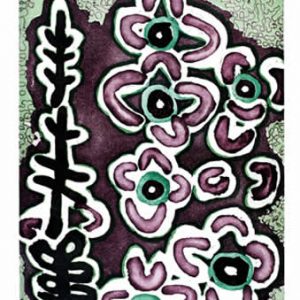Description
This painting depicts the natural landscape around
Yuendumu. The bush around Yuendumu features plenty of
‘watiya’ (trees), ‘marna’ (grass), ‘kuyu’ (animals) to hunt, and
‘miyi’ (edible plants) to gather.
There are a number of beautiful natural features close to
Yuendumu, including rocky hills, creeks, soakages, and
waterholes. There are also a number of small outstations
around Yuendumu. These include Yuwali (Bean Tree),
Wakurlpa, Purturlu (Mt. Theo), Jirla (Chilla Well),
Yarripirlangu, Wayililinpa, and many more.
There are many sites around Yuendumu that are associated
with different ‘Jukurrpa’ (Dreamings). These sites include a
major ‘yunkaranyi Jukurrpa’ (honey ant Dreaming), which
travels from the west to the east. Yuendumu is sometimes
also called ‘yurrampi’ (honey ant) for this reason.
A very big ‘ngapa Jukurrpa’ (water Dreaming) travels past
Yuendumu from the south far to the north. This Jukurrpa
stops at Warlura, a waterhole 8 miles east of Yuendumu,
and at Jukajuka, an important rock formation.
‘Warlukurlangu Jukurrpa’ (fire country Dreaming) lies to the
west of Yuendumu, on the way to Nyirrpi. You can see the
‘warlu’ (fire) in the form of hundreds of red ‘mingkirri’
(termite mounds) that rise out of the ground in this area.
Other Jukurrpa around Yuendumu include a ‘janganpa
Jukurrpa’ (brush-tailed possum [Tricosurus vulpecula]
Dreaming) associated with the hills to the north, and a
‘yankirri Jukurrpa’ (emu [Dromaius novaehollandiae ]
Dreaming) associated with Ngarlikirlangu, a rock formation
to the north. A ‘warlawurru Jukurrpa’ (wedge-tailed eagle
[Aquila audax] Dreaming) is associated with the Wakurlpa
outstation and hills. A very big ‘warna Jukurrpa’ (snake
Dreaming) passes through Mijirlparnta (Mission Creek),
west of Yuendumu. This Jukurrpa tells the story of a blind
and crippled python, Yarripiri, who was carried by the
‘kurdungurlu’ (custodians) of the Jukurrpa from the south to
the far north. This Jukurrpa is associated with the important
Jardiwarnpa conflict resolution ceremony.
All the sites around Yuendumu are owned and cared for by
different skin subsections and are associated with different
Jukurrpa. Some people are ‘kirda’ (owners) of the Jukurrpa,
and others are ‘kurdungurlu’ (custodians).
In Warlpiri paintings, traditional iconography can be used to
represent the landscape around the area, the Jukurrpa, and
other elements. Paintings of Jukurrpa around Yuendumu can
include emu tracks, possum tracks, or eagle tracks. Wavy
lines are frequently used to represent water or fire, and
concentric circles can represent waterholes or camps.





